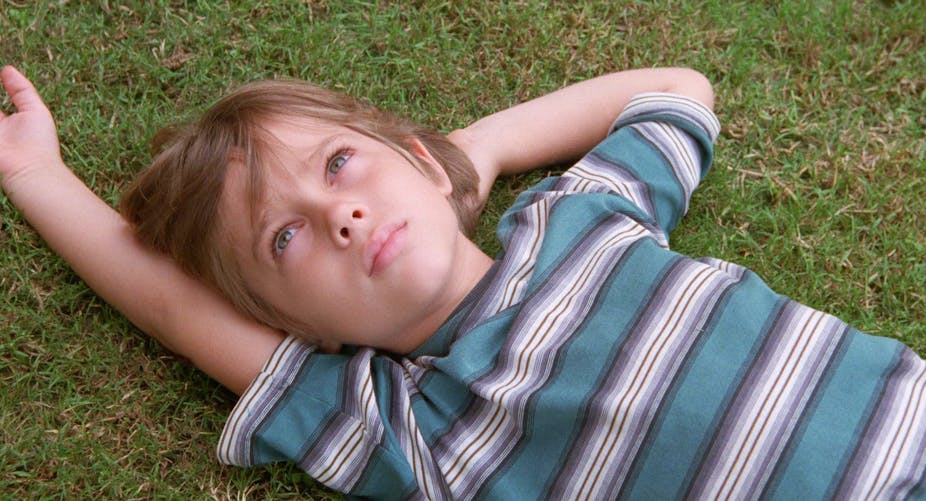Boyhood is the front-runner in this year’s Sydney Film Festival Competition, to be decided on Sunday. In it, American writer and director Richard Linklater looks at a young boy’s life from the beginning of school to the start of university. Sounds boring? Let’s remember who the director is.
Linklater’s films are most commonly associated with youth counter-culture, from Slacker (1991) to Dazed and Confused (1993) to Waking Life (2001) to School of Rock (2003) and the Before films (1995, 2004, 2013), his characters wander reflectively through critical moments in their own lives.
The social institutions of education are crucial to these reflective ruminations. Linklater’s slackers are not existential loners but epistemological questers: their wanderings are not solo but rather collective. The collective is defined by inquiry and discovery. Linklater’s wandering bands can be placed in interesting juxtaposition to director Jim Jarmusch’s soloists.
Back to Boyhood. As usual, Mason (Ellar Salmon) is not alone; he moves through life with others, principally his mother, Olivia (Patricia Arquette), and his sister, Samantha (Lorelei Linklater) but also his father Mason Sr (Ethan Hawke) whom, while estranged from his mother, enters the boy’s life and develops an ever stronger and more intimate relation with his son and daughter.
The estrangement of his parents is decisive but not destructively so. It is decisive since Olivia must follow work, but it is not destructive because the movement from job to job, from place to place, and school to school proves, in the end to be not aimless but ambitious. It’s not entrapment in poverty but social mobility, both for Mason Sr who maintains contact regardless of where in Texas his children live, and for Olivia, who becomes a university professor.
The film ends on the eve of Mason’s exit to university. In fact, by the end of the film every member of the family is either at university or has recently changed their life through university education. What is more, they do this through the non-elite state-based university system.
Boyhood clearly extends the reach of Linklater’s other films. This film manages to span 12 years of fictional time and 12 years of real time, though Patricia Arquette and Ethan Hawke do not seem to age that much – that is perhaps why Linklater gives Hawke an incongruent moustache, to force him to age a little.

This composition of the real and the fictional is its greatest achievement. By the end of the film we feel a sense of the complexity of real time. Where other film-makers opt for complexity of time through non-sequential plotting, or through plotlessness, Linklater goes for the complexity of lived time.
The film works principally by creating a sense that events are subsumed in the wider, deeper and more profound movement of life. in that sense, it’s less about the boy than the surrounding “hood”.
I see the shadow of Italian director Frank Capra in Linklater’s work. I’m not surprised this film is already winning plaudits.
The Sydney Film Festival runs until Sunday June 15. See more Conversation coverage here.

